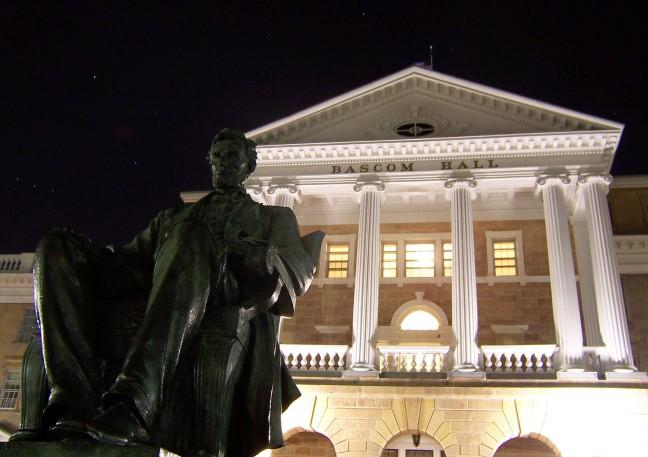In a report detailing the results of the campus climate survey released earlier this year, the University of Wisconsin claimed its results, which included findings that minority students experience a less positive campus climate, are similar to other universities across the country.
The report emphasizes that the university hopes to use the results to improve the campus community for all students. The goal of the survey, according to the report’s official text, was to understand how students’ experiences affect perception of the campus climate, especially as this relates to disparities in experience for students of different identities.
Of all UW undergraduate and graduate students invited to participate, the report found 21 percent students completed the survey. UW found the demographic of student respondents to be reflective of the student body as a whole.
In a conference call earlier this month with Madison area reporters, UW Chancellor Rebecca Blank spoke about the survey results and the goals of the university going forward.
“This is the first time we have surveyed students on campus climate,” Blank said. “It is part of what we are trying to make a transparent and data driven approach to creating a campaign where every student feels welcome, feels safe and is able to thrive.”
While the survey found roughly 80 percent of the total population of students at UW experience a positive campus climate, the report also found disparities among certain demographics.
Historically underrepresented groups, including LGBQ students, trans/non-binary students, disabled students and students of color shared overall more negative views on campus climate.
A number of universities have released similar campus climate surveys, including the University of Illinois System, the University of California at Berkeley and the University of Michigan.
Upon UW’s release of the survey results, Chancellor Rebecca Blank said UW’s results were similar to the findings at these other schools.
“While the results are not directly comparable because the surveys are not identical, the findings were broadly similar, particularly the disparities in experience among students based on personal identity,” Blank said.
In campus climate surveys conducted at other universities, there were differences in the number of students surveyed, method of analyzing data, responses rates and demographic of student bodies.
Despite these differences, all of these universities reported a less positive campus climate for minority students. Additionally, creating a more inclusive environment for students who do not experience a positive campus climate was a central resolution in all of these schools’ reports.
Upon review the results of the UW survey, a task force including students and faculty made recommendations aimed at eliminating these disparities. UW Chief Diversity Officer Patrick Sims, co-chair of this task force, said the university is actively working toward creating a more inclusive campus climate through its faculty and student populations.
“We are very keen on boosting recruitment of underrepresented students, faculty and staff,” Sims said. “And most importantly, we not only want to recruit them, we want to retain them. We are focused on increasing the capacity of students, faculty and staff to intervene when possible and respond to hostile, harassing, and or intimidating behavior.”
Sims also highlighted programs launched by UW in the last two years aimed at addressing campus climate issues.
The “Our Wisconsin” program and certain elements of the SOAR program for incoming freshmen are examples of institutional efforts on UW’s part to create a more positive campus climate for all students, Sims said. Additionally, both programs are sufficient methods to get responses from the 80 percent of students who did not participate in the campus-wide climate survey.
“The ‘Our Wisconsin’ program is a huge step in this direction to create an environment where students understand that people bring different lenses to the work that they are engaging in,” Sims said. “The SOAR introductory program also reaches out to everyone before they come to campus.”
According to the report, campus-wide climate surveys will be conducted every four to five years so that the institutional implementations pursued by UW have time to take effect before the next survey is conducted.
Many universities, including the University of California-Berkeley and the University of Michigan, reviewed the results of their respective surveys and determined similar courses of action in a systemic, institutional effort to create a more inclusive campus environment.
Diversity training, hiring of more diverse staff, faculty mentorship programs, the upholding and recognition of free speech and university-sponsored diversity programs are of the many recommended actions from the campus climate survey task force.
“We have to insist that and ensure that every student on our campus is free from harm, has a strong sense of belonging, and is treated with respect. Anything less is simply unacceptable,” Blank said. “We are working very hard to address these disparities, but this is an effort that is going to require everyone’s involvement. It cannot be done just from the top down.”


